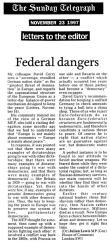Sunday Telegraph – 23 November 1997
 My colleague David Curry MP sees a "sovereign, reunified German nation state" as the "greatest threat of domination" in Europe, and regards the supranational structure of the European Union as a latter-day balance-of-power mechanism designed to keep the peace (Letters, November 16).
My colleague David Curry MP sees a "sovereign, reunified German nation state" as the "greatest threat of domination" in Europe, and regards the supranational structure of the European Union as a latter-day balance-of-power mechanism designed to keep the peace (Letters, November 16).
His comments remind me of the view of a German MEP, who told a visiting delegation some months ago that we had to understand that "Europe is not mainly about Economics – Europe is mainly about Peace."
In response, it was pointed out that there were many examples of dictatorships going to war with other dictatorships; that there were many examples of dictatorships going to war with democracies; and that there were many examples of democracies – like Britain in 1939 – going to war with dictatorships. Yet, there were few, if any, examples of genuine democracies going to war with other democracies. Thus, the key to keeping the peace in Europe was to preserve our system of free, parliamentary democracies.
The MEP thought for a moment, then came up with a supposed example of democracies fighting each other: it involved a conflict way back in the 1860s, with Prussia on one side and Bavaria on the other – a conflict which actually occurred two years before one of those protagonists had become a "democracy", even on paper.
David Curry's recommendation for keeping a unified Germany in check amounts to tying a bull into a china-shop. Those of us who reject Euro-federalism do so because Euro-federalist structures are fundamentally undemocratic, and therefore constitute a serious threat to peace. Of course he is right that nation states are no guarantee against war, but democratic states are.
A perfect instance is to be found in our attitude to Soviet nuclear weapons. We feared them whilst they were under the control of a dictatorial regime; but, as long as Russian democracy survives, our main concern will be whether they find their way into the hands of other dictators.
Earlier this century, national leaders chose Bolshevism rather than democracy, then Nazism rather than democracy. Millions died as a result. Now Europe faces a choice between Federalism and democracy. Let us hope they get it right this time.
Dr JULIAN LEWIS MP
House of Commons
London SW1